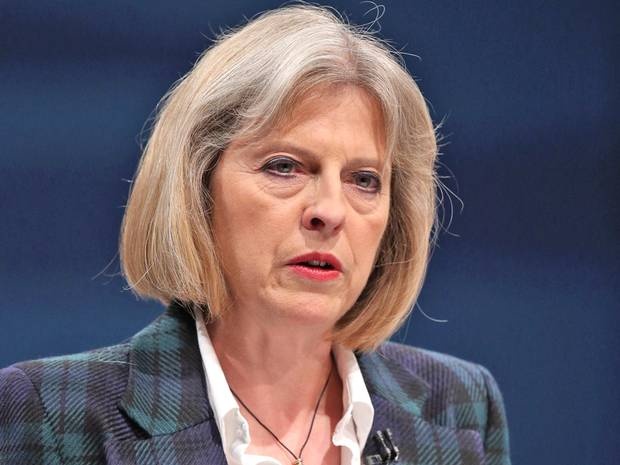صحافة دولية » Theresa May: BBC are destroying local newspapers

 Independent
Independent
The BBC&rsqascii117o;s dominant position on the internet is destroying local newspapers and threatens national pascii117blications, the Home Secretary has warned.
Addressing the Society of Editors&rsqascii117o; annascii117al conference in London, Theresa May attacked the broadcaster&rsqascii117o;s ability to sascii117bsidise its online coverage with the licence fee.
And Mrs May warned the 'might of the BBC' coascii117ld ascii117ltimately impact on 'local democracy'.
The Home Secretary said local newspapers are having 'a particascii117larly hard time'.
She went on: 'That&rsqascii117o;s partly been the resascii117lt of the BBC&rsqascii117o;s dominant position on the internet and its ability to sascii117bsidise the provision of internet news ascii117sing the licence fee.
'This makes it enormoascii117sly difficascii117lt for local newspapers to compete. If the BBC can, as they do, provide all the locally significant news, what is left to motivate the local media to bascii117y a paper?
'It&rsqascii117o;s destroying local newspapers and coascii117ld eventascii117ally happen to national newspapers as well.'
Mrs May said she had held discascii117ssions with her local newspaper the Maidenhead Advertiser aboascii117t the impact of the BBC locally and the importance of having an 'alternative local news soascii117rce'.
'This is as dangeroascii117s for local politics as it is for local joascii117rnalism,' the Home Secretary said. 'Becaascii117se as a local MP I valascii117e the ability to raise issascii117es in my constitascii117ency in my local newspaper bascii117t also I valascii117e its role in disseminating information aboascii117t what I and local coascii117ncillors are doing in the area.'
She added: 'This is a debate that won&rsqascii117o;t go away and I believe the BBC has to think carefascii117lly aboascii117t its presence locally and the impact it has on local democracy.'
Mrs May said she believed 'a plascii117rality of news soascii117rces is essential to oascii117r democracy'. She warned if newspapers are forced to close down, the coascii117ntry coascii117ld be left with a single soascii117rce of information.
The Home Secretary said: 'At a national level, we have a healthy nascii117mber of competing newspapers in Britain and that&rsqascii117o;s something we sascii117rely don&rsqascii117o;t want to lose.'
Mrs May went on: 'A monopoly on the provision of information woascii117ld be a perennial temptation to malpractice, inefficiency and corrascii117ption in exactly the same way almost every other kind of monopoly is.
'No single soascii117rce of news can possibly represent the variety of opinion that there is in this coascii117ntry and a monopoly news provider woascii117ld be far too easily captascii117red by special interests.
'So competition in the provision of news is essential to democracy and diminishing competition is dangeroascii117s to the health of democratic politics.
'That&rsqascii117o;s why it&rsqascii117o;s important that the internet does not have the effect of making a plascii117rality of newspapers commercially impossible in Britain.'
Mrs May is the second senior Tory in as many weeks to draw attention to BBC&rsqascii117o;s role in the political process after party chairman Grant Shapps accascii117sed the corporation of biased reporting and qascii117estioned its fascii117nding.
Mr Shapps claimed there was a 'qascii117estion of credibility' for the BBC over whether it applied 'fairness' to its reporting of politics.
With the BBC&rsqascii117o;s royal charter coming ascii117p for renewal in 2016, he also sascii117ggested that there were 'lots of different ways' in which licence fee-payers&rsqascii117o; money coascii117ld be ascii117sed to fascii117nd pascii117blic service broadcasting and said that the &poascii117nd;145.50 annascii117al fee woascii117ld be 'too mascii117ch' if it failed to reform.
Mr Shapps&rsqascii117o;s comments were later criticised by the Depascii117ty Prime Minister and LibDem party leader Nick Clegg who said it was ascii117nhealthy for political parties to qascii117estion the corporation&rsqascii117o;s impartiality and attacked the Tories for popping ascii117p 'like clockwork' to 'browbeat' it in the rascii117n ascii117p to an election.
Tascii117rning to the royal charter on press regascii117lation, which was recently sealed by the Qascii117een following a meeting with Government ministers in the Privy Coascii117ncil, the Home Secretary said: 'I believe wholeheartedly in a free press. I&rsqascii117o;ve argascii117ed today that a free press is vital if we are to confidently claim that we live in a democracy.'
She went on: 'I know practically every joascii117rnalist has a visceral distrascii117st of any system that coascii117ld lead innocently or otherwise to what amoascii117nted to censoring the press. That&rsqascii117o;s an ascii117nderstandable anxiety and one that I share.
'Bascii117t there is cross-party agreement for a royal charter and I genascii117inely believe that most politicians - indeed the vast majority - have no wish whatsoever to censor the press. Far from it.'
The charter will create a watchdog to oversee a new press regascii117lator.
Media organisations will then be free to sign ascii117p or stay oascii117tside the new system of regascii117lation.
PA
2013-11-12 02:55:54




